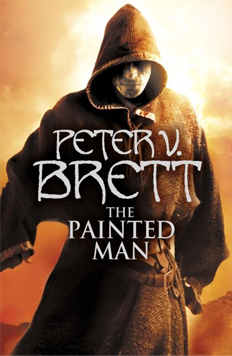I read this because it was promoted as Urban Fantasy, and alleged to be similar to the Rivers of London series, with which I’m a bit obsessed. I suppose there are some similarities, but Fated is markedly less good. I feel this may be because Mr Verus spends a lot of his time being knowing about things that are completely alien to the reader, so we don’t really get what he’s being knowing about, or why it’s impressive. Also, the decision to call the great Dark Mage who scarred Verus’ youth ‘Richard’ was perhaps not the best. Funnily enough, Looking For Group uses that very name as a name hilariously unsuitable for a Dark Lord:
So every time the Dread Richard was mentioned as a demon from Verus’ past, I had a mental image of LFG Richard going ‘Fwoosh!’ which ruined the image of cold sophistication Jacka had been going for.
I was also led to expect a realistic evocation of the city of London. Unfortunately, the descriptions did not resonate with me, possibly because I have been spoiled by Ben Aaronovitch, whose descriptions of both place and people are just better. Fated could have been happening anywhere that has tall buildings. The British Museum features quite centrally, but I didn’t get much of a sense of uniqueness of the space. Overall, I felt like I was being told a lot of things rather than being shown them, which grates a little. Then again, given that I want to write and publish myself, I feel like I should try not to be too judgmental: I did enjoy the book, I’m just being picky. (Although I can’t resist pointing out that the author’s headshot on his webpage is truly hilarious:
The Aristotle pose? Really?)
To summarise the plot: Alex Versus, probability mage, nightmare-sufferer and all-round mensch, runs a magic shop in Camden. His magic skill enables him to look into the future, and see the outcome of any given potential action. On a day like any other, a nefarious Greek-looking person from his past walks into the shop to offer him a job for The Council. At this point the reader discovers that there is a Council of Light Mages, and a bunch of fractious Dark Mages to whom teamwork is like altruism to cats. Versus likes neither, but through a series of coincidences somewhat frustrating for someone who can see the future, he manages to end up working for both.
The controversy centres on a statue, which contains a priceless artefact that has been locked away for centuries, and is reputed to give the possessor endless power. Understandably, everyone wants it for themselves, and all are willing to kill to get it. Except for Alex, because he’s a mensch. And mostly everyone wants to kill him.
Alex is joined by Luna, a girl with an ancient curse that causes everyone who comes near her to have terminally bad luck, and Starbreeze, an air elemental of female persuasion, who is described as being simply dumb. They are helped out by Arachne, who is an enormous spider that makes beautiful clothes with magical properties, and a straight-edged bureaucrat/ Council member whose name I’ve forgotten, which fits with the character.
The magical elements of the story are managed reasonably well – Verus’ ability to look into the future is not overly deterministic, and doesn’t give him too much of an edge over the other characters. Luna’s curse is incredibly depressing, but hope is introduced gradually over the course of the narrative, which is nice. There are also lots of jolly explosions and things being smashed, which is always good in an urban fantasy story.
One final thing that was a bit annoying: throughout the novel there are allusions to the past that don’t always gel with the narrative of the present. They are generally important for character development, but the way they are introduced and the amount of information they convey doesn’t work. A lot of the time, I felt like the narrative was presenting itself to me as an outsider, instead of feeling completely absorbed by the story.
But, all whingeing aside, I quite enjoyed this book, and I look forward to reading the next one, to find out what happens to Luna and her curse. Oh, and to see if I’ll finally be introduced to this nefarious, ballroom-dancing Richard.














